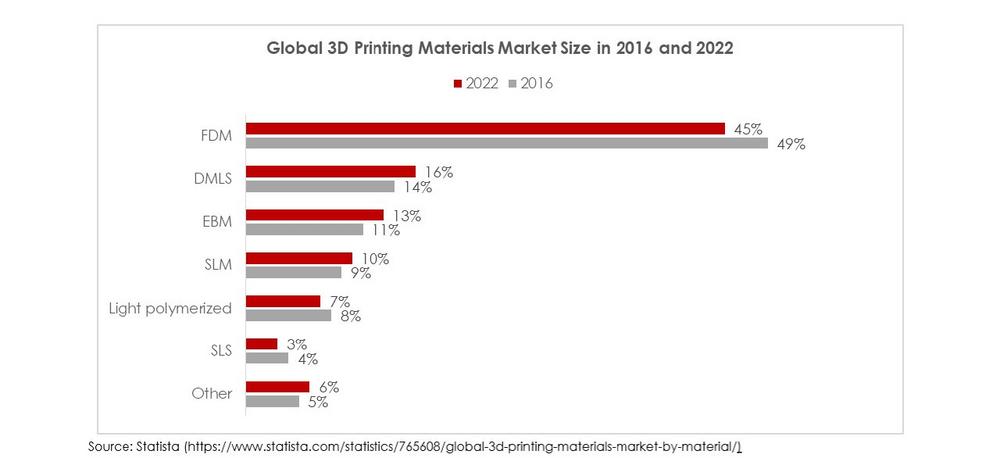A key driver of this market size is the introduction of high performance polymers and engineered polymeric materials to the AM sector through the Material Extrusion technologies. These materials have far reaching meaning in various industries and have traditionally been processed using injection moulding or CNC milling techniques. Due to the fact that these materials are thermoplastic in nature, their properties make them difficult to process when subjected to processing methods where phase change is necessary. All 3D printing methods involve phase-change in materials. For thermoplastic materials, the processing challenge gets amplified by the fact that their microstructure can be complicated due to the formation of crystalline or amorphous domains either in exclusive terms or in co-existence. These microstructural changes can precipitate defects or poor quality 3D printed parts if uncontrolled.
In the global AM sector Apium has historically played a pioneering role in the use of high temperature/performance polymer based materials. Its 2015 launch of the PEEK filament and HPP 3D Printer designed for this class of materials set the pace for other machine manufacturers as well as materials suppliers to make entry into this uncharted processing space. Apium has since introduced PVDF, POM-C and PEI 9085 in 2016 and in 2017 carbon fiber reinforced (CFR) PEEK. What makes Apium’s technology unique is the proprietary temperature management system. This system is specially developed for the handling of the state transformation which occurs when the solid filament material (such as PEEK) changes to the melt state then back to the solid state during the printing process. The rate at which this transformation occurs directly influences the kind of microstructure as well as the macro-physical properties of the 3D printed part.
Indeed achieving successful results with Material Extrusion (FFF) 3D printing requires good knowledge in designing for AM, the 3D printing of PEEK as well as other high performance polymers, and also a good knowledge in materials; especially how materials are created and how their properties can be engineered.
Apium`s technology has created a unique access to defining how the properties of materials like PEEK can be created from the control of the 3D printing process. PEEK parts 3D Printed using Apium’s P220 printer allow for inducing regions of different crystallinity including the literature specified crystallinity for PEEK in key applications such as medical.
The advanced technology of Apium does not only secure the crystallinity of PEEK, but also minimizes the commonly experienced 3D printing defects such as;
- Warping,
- Under-extrusion,
- Over-extrusion,
- Poor surface finish,
- Cracks,
- Poor layer adhesion,
- Gaps on outer wall.
Apium bring the most experience in PEEK 3D Printing, the company`s CTO, Prof. Dr. Brando Okolo has over 16 years of experience in materials research and drives the technological developments for advanced materials. Under his leadership, the technical team at Apium has amassed expertise in the 3D printing of high performance polymers. With this expertise Apium is able to support the end-users in an excellent manner ensuring the transfer of know-how through advanced trainings to achieve best-in-class results from material selection to successfully 3D printed parts.
4 Phases to Successful Implementation of Industrial 3D Printing
Apium`s Applications and Services Center is dedicated to best customer experience. It consists of the best of skilled AM engineers with experience in materials science, design engineering for 3D Printing, application engineering and 3D printing of advanced polymers. The team evaluates the requirements of each end-user and establishes an advanced training program. With this advanced training program, end-users will overcome the challenges in Material Extrusion (FFF) 3D Printing of PEEK and other high performance polymers.
The Head of the A&S Center, Mr. Sasidhar Gorantla (MSc) will be at Formnext to discuss future possibilities in PEEK 3D printing and other advanced materials including metals and composites. Visit Apium at booth 3.1-C70 between 13-16.11.2018. You can set an individual appointment with Apium experts here: (the link will be added here)
We research, develop and produce Fused Filament Fabrication 3D printing filaments made from high performance polymers along with 3D printers to process them. After intensive research, we became the first company worldwide able to make PEEK (poly ether ether ketone) printable with the FFF 3D printing technology. As pioneers, we assure the best and most reliable print quality on the market. With our expertise and experience in practical applications, together with basic research, we have a unique competence center for small and medium enterprises from industries that use high performance polymers for the most demanding environments and applications.
With our strong core-competencies we strive to become the largest technology supplier of high performance filament materials and 3D printers for FFF 3D printing technology within the European market. Our goal is to set the industry standard in terms of quality and reliability at FFF 3D printing of high performance polymers. As a competence center we claim on the legitimacy to be present on the market and to take over a long-term leading role. Through our know-how and our expertise in the field of FFF 3D printing we assure our customers the highest quality and the best service.
Apium Additive Technologies GmbH
Siemensallee 84
76187 Karlsruhe
Telefon: +49 (721) 13 20 95 0
Telefax: +49 (721) 13 20 95 77
http://www.apiumtec.com/
Head of Marketing and Quality Management
Telefon: +49 (721) 6803087-0
E-Mail: pinar.karakas@apiumtec.com
![]()
